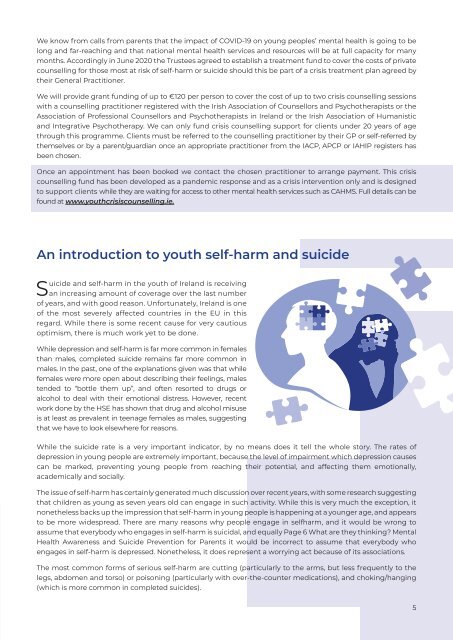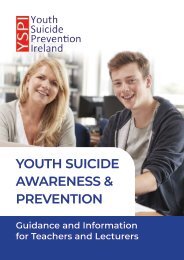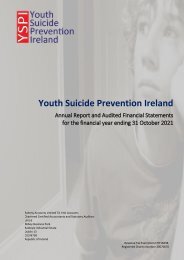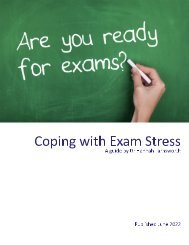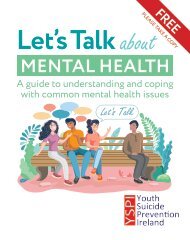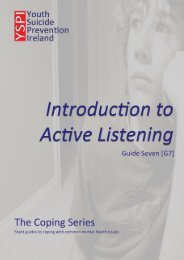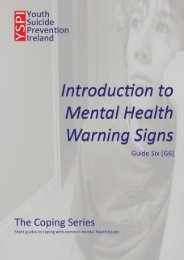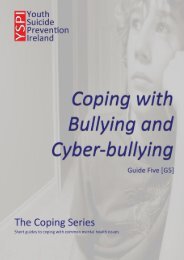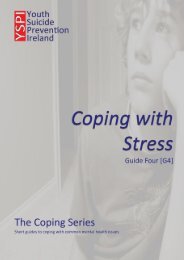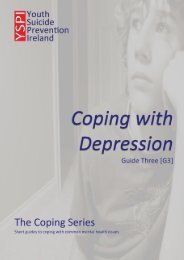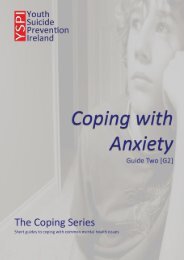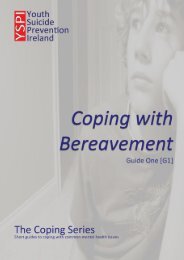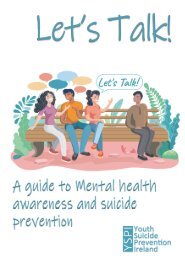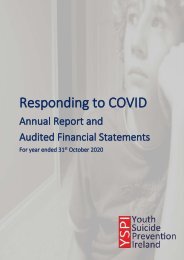What are they thinking? - YSPI Parents Handbook
A Parents Handbook to youth mental health and suicide prevention, now in it's 10th edition. Topics covered include: * Introduction to youth mental health awareness * Awareness of mental health risk factors * Recognising the symptoms of mental health issues * Helping someone with mental health issues * Understanding the dangers: Cyber-bullying Online Dangers Locked-away Syndrome * Supporting and developing coping strategies * Warnings signs of suicidal thoughts * Suicide Prevention and intervention * How to help and get help
A Parents Handbook to youth mental health and suicide prevention, now in it's 10th edition.
Topics covered include:
* Introduction to youth mental health awareness
* Awareness of mental health risk factors
* Recognising the symptoms of mental health issues
* Helping someone with mental health issues
* Understanding the dangers:
Cyber-bullying
Online Dangers
Locked-away Syndrome
* Supporting and developing coping strategies
* Warnings signs of suicidal thoughts
* Suicide Prevention and intervention
* How to help and get help
You also want an ePaper? Increase the reach of your titles
YUMPU automatically turns print PDFs into web optimized ePapers that Google loves.
We know from calls from p<strong>are</strong>nts that the impact of COVID-19 on young peoples’ mental health is going to be<br />
long and far-reaching and that national mental health services and resources will be at full capacity for many<br />
months. Accordingly in June 2020 the Trustees agreed to establish a treatment fund to cover the costs of private<br />
counselling for those most at risk of self-harm or suicide should this be part of a crisis treatment plan agreed by<br />
their General Practitioner.<br />
We will provide grant funding of up to €120 per person to cover the cost of up to two crisis counselling sessions<br />
with a counselling practitioner registered with the Irish Association of Counsellors and Psychotherapists or the<br />
Association of Professional Counsellors and Psychotherapists in Ireland or the Irish Association of Humanistic<br />
and Integrative Psychotherapy. We can only fund crisis counselling support for clients under 20 years of age<br />
through this programme. Clients must be referred to the counselling practitioner by their GP or self-referred by<br />
themselves or by a p<strong>are</strong>nt/guardian once an appropriate practitioner from the IACP, APCP or IAHIP registers has<br />
been chosen.<br />
Once an appointment has been booked we contact the chosen practitioner to arrange payment. This crisis<br />
counselling fund has been developed as a pandemic response and as a crisis intervention only and is designed<br />
to support clients while <strong>they</strong> <strong>are</strong> waiting for access to other mental health services such as CAHMS. Full details can be<br />
found at www.youthcrisiscounselling.ie.<br />
An introduction to youth self-harm and suicide<br />
Suicide and self-harm in the youth of Ireland is receiving<br />
an increasing amount of coverage over the last number<br />
of years, and with good reason. Unfortunately, Ireland is one<br />
of the most severely affected countries in the EU in this<br />
regard. While there is some recent cause for very cautious<br />
optimism, there is much work yet to be done.<br />
While depression and self-harm is far more common in females<br />
than males, completed suicide remains far more common in<br />
males. In the past, one of the explanations given was that while<br />
females were more open about describing their feelings, males<br />
tended to “bottle them up”, and often resorted to drugs or<br />
alcohol to deal with their emotional distress. However, recent<br />
work done by the HSE has shown that drug and alcohol misuse<br />
is at least as prevalent in teenage females as males, suggesting<br />
that we have to look elsewhere for reasons.<br />
While the suicide rate is a very important indicator, by no means does it tell the whole story. The rates of<br />
depression in young people <strong>are</strong> extremely important, because the level of impairment which depression causes<br />
can be marked, preventing young people from reaching their potential, and affecting them emotionally,<br />
academically and socially.<br />
The issue of self-harm has certainly generated much discussion over recent years, with some research suggesting<br />
that children as young as seven years old can engage in such activity. While this is very much the exception, it<br />
nonetheless backs up the impression that self-harm in young people is happening at a younger age, and appears<br />
to be more widespread. There <strong>are</strong> many reasons why people engage in selfharm, and it would be wrong to<br />
assume that everybody who engages in self-harm is suicidal, and equally Page 6 <strong>What</strong> <strong>are</strong> <strong>they</strong> <strong>thinking</strong>? Mental<br />
Health Aw<strong>are</strong>ness and Suicide Prevention for P<strong>are</strong>nts it would be incorrect to assume that everybody who<br />
engages in self-harm is depressed. Nonetheless, it does represent a worrying act because of its associations.<br />
The most common forms of serious self-harm <strong>are</strong> cutting (particularly to the arms, but less frequently to the<br />
legs, abdomen and torso) or poisoning (particularly with over-the-counter medications), and choking/hanging<br />
(which is more common in completed suicides).<br />
5


